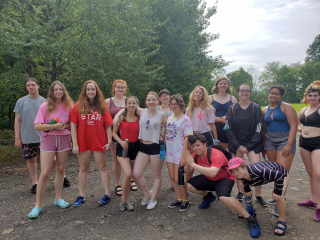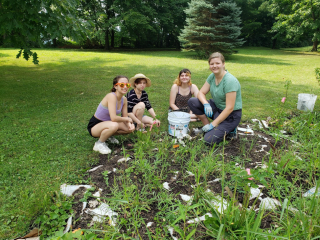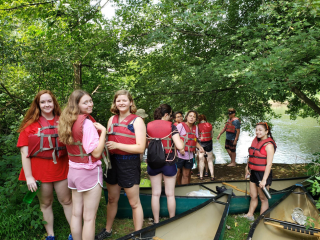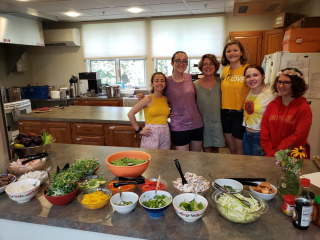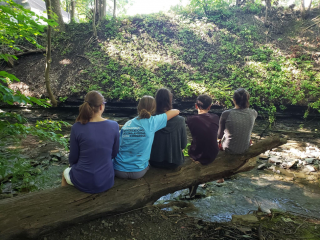Shifting How We Support Youth Leaders
This past summer Central East Region (CER) piloted a new leadership experience for Youth called River Rising. Twice we gathered 10-11 High School age Youth, we called the CRRUU (Community of River Rising Unitarian Universalists), and 6-8 Youth and Adult Guides and spent a week in community, playing, working, caring, cooking, reflecting, singing, praying, writing, and just being with one another. Our hosts were the Unitarian Universalist (UU) Fellowship of Centre County in State College, PA and the UU Society of Schenectady in upstate New York.
Through this experience and other CER Youth programs we’re shifting how we talk about supporting youth who care for their communities, plan worship, comfort friends, do hard things, have a considerable Instagram following, attend rallies and marches, teach songs, lead games, babysit their siblings, start non-profits, learn CPR… in other words Youth Leaders… in other words any given youth at any given time. Our first big shift is recognizing that any youth in our congregations and programs has the capacity to act as a leader. There is a reason the UUA General Assembly 2019’s theme was The Power of We. The strength of a community actually lies in the possibility of all its members moving into and out of leadership as needed, not one or two leaders juggling all the balls.
The youth and adults who have been hired to facilitate the River Rising Experience are called Guides because a guide is on the journey alongside you, experiencing and learning, but they’re also the ones that hold the map, know the plan and are mindful of everyone’s safety. We’re modeling that being a leader or facilitator doesn’t mean you necessarily have all the answers or are the expert on everything. In fact, a good leader recognizes the experience and wisdom in a room or community and uses “power-with” to facilitate and encourage the sharing of those resources.
We want leadership to feel more accessible and fluid. In collaborative groups called Ministry Teams the youth were tasked with meal planning, cooking, clean-up and worship planning. They combined their skills, passions and desires and used them to care for the whole River Rising Community. They designed inclusive meals that took everyone’s dietary needs into account, incorporating family recipes, traditions and stories. And they were healthy, delicious and satisfying! The evening worships were a highlight of our day, feeding our minds and spirits. Teaching songs, leading spiritual practices, and writing reflections and prayers are all ways in which we help care spiritually for our communities. Through Ministry Groups and other experiences at River Rising we built confidence, pride in our work and trust in one another. Everyone has something to contribute, sometimes they just need the invitation and encouragement.
Self care and community care was also a theme throughout our week. When we talked about our experiences seeing (or being!) really strong youth leaders who burned-out and sometimes left our communities heartbroken and disillusioned there was a lot of head nodding in agreement. A nurturing community not only covenants around it’s leaders and members practicing self care and communicating when they need to move back or say no, it actively encourages them to take care of one another by regularly checking in, offering help and allowing them to bring their whole selves. It’s exhausting when we feel like we need to hide parts of ourselves to be in community. At River Rising CRRUU and Guides are encouraged to share things they think the community should know about how they function, cope and best thrive in these kinds of spaces. The sharing leads to a lot of “Me toos!” and more compassion and understanding as we progress through the week. Many youth said “Wow, no one’s ever asked me that before, thank you.” This is how we become more inclusive and accessible, we don’t just focus on the obvious and visible differences people are experiencing, we invite them to share what they want and need us to know about how to support them.
Youth are naturally in a stage where they are learning to set boundaries and be responsible for their own well being. At River Rising we practiced this by spending a whole day without our devices. When I asked them what kinds of things they had witnessed online I was actually shocked to hear their stories. There is no way I—as a parent, as a youth advisor, as a religious educator—can completely shield or even monitor what they will encounter online and in real life as they become young adults. But we can help them develop autonomy, set boundaries and practice consent. And we can apply these skills to leadership opportunities in our congregations. The youth who attend River Rising might not be ready to join every committee or work on every project their congregation has to offer youth. But hopefully they will be discerning and honest about what they really have the time and enthusiasm to take on and will communicate clearly and respectfully their boundaries.
As my colleague Evin Carvill-Ziemer said one afternoon, while we sat in the grass under shade trees on the Schenectady campus, “When we planned River Rising we realized we couldn’t in all consciousness talk to you about leadership without also making space for you to talk about how you feel about the state of our planet.” While we didn’t solve the climate crisis at River Rising, or obliterate social diseases like racism and xenophobia, we did make space for feelings. We also talked about the importance of dreaming up creative solutions and new ways of thinking about the world, the place of fiction writing in that dreaming, the role of community and spiritual grounding when times get tough and the idea that active hope calls us to vigorously work towards the future we choose. I learned from them that they are tired and frustrated with adults who just want to talk; they crave action, service, honesty and the acknowledgement of even small accomplishments in the battle for our future.
We can continue in shifting how we support youth and youth in leadership in our congregations by listening to them and then following through with the things we promise. River Rising will continue learning, shifting and adapting based on the experiences and suggestions of the youth who attend. We’re using a practice of emergence for this new leadership experience and so not only will we try new things at each iteration, we’ll use feedback and lessons learned to continually better the experience for Guides and CRRUU. Just as each congregation in our association is different based on the members that make it up and the community in which it is located, each River Rising will be different based on the people who gather to share their stories and gifts and the locations we choose. It’s very true that you can’t step into the same river twice. But we can learn so much each time we do!


